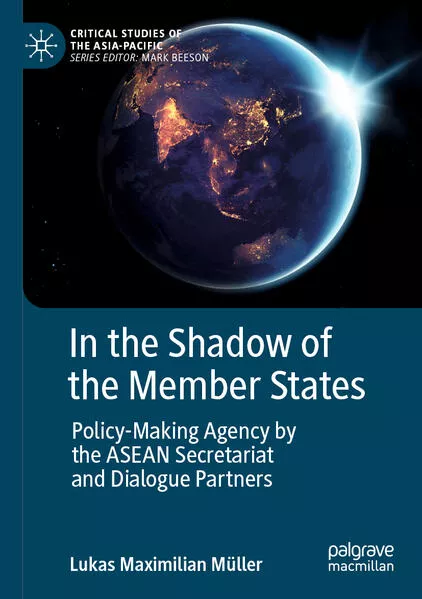
- Publikationen ca: 3
- Fragen & Antworten
Lukas Maximilian Müller
Lukas Maximilian Müller is Caritas Germany’s advisor to the Lake Chad region. Previously, he was a researcher at the Department of Political Science at the University of Freiburg, where he also received his PhD. In addition, he was a post-doctoral researcher at the University of Erfurt as well as an advisor on sustainable development for the Asia-Europe Foundation in Singapore. During his PhD, he was a visiting fellow with the Centre for Strategic and International Studies Indonesia in 2018 as well as with the Habibie Center in 2019. He has published widely on ASEAN, for instance in the Pacific Review, the Contemporary Journal of East Asia Studies, and the European Journal of East Asian Studies.
In the Shadow of the Member States
This book provides practice-oriented insights into the agency of two previously underestimated actors in Southeast Asian regionalism: the ASEAN Secretariat and ASEAN’s dialogue partners. In doing so, it offers an inside view of the policy-making processes in the ASEAN Political-Security and the ASEAN Economic Community, analyzing the interplay and agency by both actors in agenda setting, formulation, decision making, implementation, and monitoring.
In the Shadow of the Member States
This book provides practice-oriented insights into the agency of two previously underestimated actors in Southeast Asian regionalism: the ASEAN Secretariat and ASEAN’s dialogue partners. In doing so, it offers an inside view of the policy-making processes in the ASEAN Political-Security and the ASEAN Economic Community, analyzing the interplay and agency by both actors in agenda setting, formulation, decision making, implementation, and monitoring.
In the Shadow of the Member States
This book provides practice-oriented insights into the agency of two previously underestimated actors in Southeast Asian regionalism: the ASEAN Secretariat and ASEAN’s dialogue partners. In doing so, it offers an inside view of the policy-making processes in the ASEAN Political-Security and the ASEAN Economic Community, analyzing the interplay and agency by both actors in agenda setting, formulation, decision making, implementation, and monitoring.


